

Does the American public oppose the Iran deal? - Nahal Toosi. Congratulations to supporters and opponents of the Iran nuclear deal!
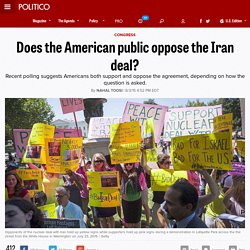
According to the polls, the American people are on your side. Except for when they’re not. Story Continued Below. Ben Wattenberg and the Changing 'Real Majority' July 6, 2015 When I attended a funeral service last week for Ben Wattenberg, it really hit me how much our country and politics have changed in the 45 years since he and Richard Scammon wrote The Real Majority, a landmark, best-selling book analyzing the American electorate and voter behavior.
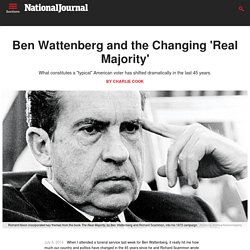
The book had been published two or three years before it was assigned reading in my freshman college class on government, so I had missed the substantial publicity it initially received. But when I began reading, I realized it was an eye-opening and mind-expanding book that needed to be written. I later had a boss who suggested that everyone in politics should read two books each year, The Real Majority and historian T.
Harry Williams's incredible biography Huey Long. I would now add Pulitzer Prize-winning author Robert Caro's (so far) four-volume set The Years of Lyndon Johnson. (RELATED: Is Facebook the Holy Grail of Political Advertising?) Oregon Is First State to Adopt Automatic Voter Registration. Seventeen years after Oregon decided to become the first state to hold all elections with mail-in ballots, it took another pioneering step on Monday to broaden participation by automatically registering people to vote.
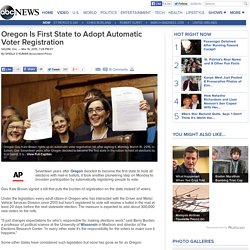
Gov. Kate Brown signed a bill that puts the burden of registration on the state instead of voters. Under the legislation, every adult citizen in Oregon who has interacted with the Driver and Motor Vehicle Services Division since 2013 but hasn't registered to vote will receive a ballot in the mail at least 20 days before the next statewide election. The religious states of America, in 22 maps. The Washington National Cathedral in Washington, D.C., Wednesday, Feb. 18, 2015.
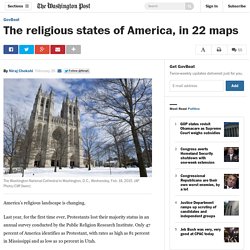
(AP Photo/Cliff Owen) America’s religious landscape is changing. The remarkable collapse of our trust in government, in one chart. No one likes -- or trusts -- the government.
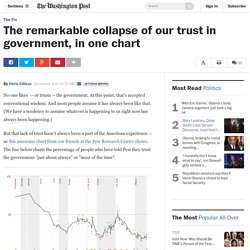
At this point, that's accepted conventional wisdom. And most people assume it has always been like that. (We have a tendency to assume whatever is happening to us right now has always been happening.) But that lack of trust hasn't always been a part of the American experience -- as this awesome chart from our friends at the Pew Research Center shows. Trust in Government Nears Record Low, But Most Federal Agencies Are Viewed Favorably. 62% Have Positive View of Federal Workers Survey Report Public trust in the government, already quite low, has edged even lower in a survey conducted just before the Oct. 16 agreement to end the government shutdown and raise the debt ceiling.
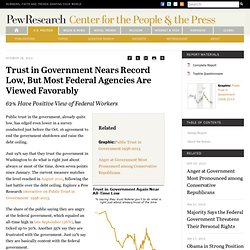
Just 19% say that they trust the government in Washington to do what is right just about always or most of the time, down seven points since January. The current measure matches the level reached in August 2011, following the last battle over the debt ceiling. Margin of Error: Polls and Public Opinion by SAS® Curriculum Pathways® Pros and cons of public opinion polls - Jason Robert Jaffe. AMERICANTRUSTEESPROJECT.ORG. Three new polls show varying leads for McAuliffe in Virginia governor’s race. Bill of Rights In the News – Commemorating 9/11 and America’s Civic Values. Summary.
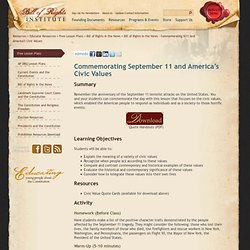
LessonPlans_HS.pdf. What Does the Constitution Actually Say About Voting Rights? - Garrett Epps. Since the Supreme Court's 5-4 decision in Shelby County v.
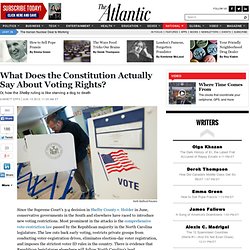
Holder in June, conservative governments in the South and elsewhere have raced to introduce new voting restrictions. Most prominent in the attacks is the comprehensive vote-restriction law passed by the Republican majority in the North Carolina legislature. The law cuts back early voting, restricts private groups from conducting voter-registration drives, eliminates election-day voter registration, and imposes the strictest voter ID rules in the country. There is evidence that Republican legislatures elsewhere will follow North Carolina's lead. Scalia fails to grasp true democracy. Recent events in Washington invite us to think about the meaning of democracy.
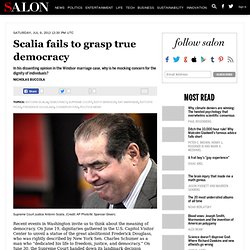
On June 19, dignitaries gathered in the U.S. Capitol Visitor Center to unveil a statue of the great abolitionist Frederick Douglass, who was rightly described by New York Sen. Charles Schumer as a man who “dedicated his life to freedom, justice, and democracy.” On June 30, the Supreme Court handed down its landmark decision in United States v. Poll: Alabama Most Conservative State in the Union, Massachusetts Most Liberal. Alabama has taken the crown previously held by Mississippi as the most conservative state in the union, according to a new Gallup poll.
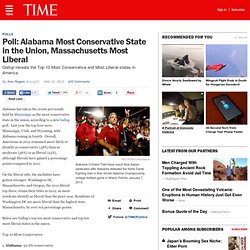
Last year the top four were Mississippi, Utah, and Wyoming, with Alabama coming in fourth. Overall, Americans in 2012 remained more likely to identify as conservative (38%) than as moderate (36%) or as liberal (23%), although liberals have gained 2 percentage points compared to 2011. New Voting Laws: Bending the Arc of History Away From Justice - Andrew Cohen. The current generation of laws could disenfranchise millions. President Lyndon B. Johnson holds the signed Voting Rights Act of 1965. Concept+Formation+Lesson. Poll Vault. Poll VaultBy Andrew Clark Illustration by John Coulter. What the Olympics can teach us about nationalism. Like most of you, I'm spending some time these days watching the Olympics. It's especially fun to see more obscure sports like fencing, table tennis, and beach volleyball get their moments in the sun, and there are always a few upsets and feel-good stories to keep us riveted. And for the record, I thought that utterly wacky opening ceremony was flat-out brilliant.
But given my day job, I can't help but see the Olympics as a sublimely teachable moment about nationalism. Every Olympic year I ask my students who they rooted for, and whether they got a subtle thrill when one of their countrymen won. TCI Lesson: Ideas That Unite Us as Americans. Thedigitalshift. A large segment of today’s youth, regardless of race or ethnic group, now actively exercise their political muscle online, says a new study from the MacArthur Research Network on Youth and Participatory Politics (YPP).
Surveying 3,000 people between the ages of 15 and 25, the study found that in the last year, 41 percent engaged in some form of digitally-based political activity, such as starting an online political group, writing or passing along a political blog, or sharing political videos. Specifically, 43 percent of white, 41 percent of black, 38 percent of Latino, and 36 percent of Asian American youth took part in at least one act of participatory politics during the prior 12 months, says “Youth & Participatory Politics.” The report defines participatory politics as “interactive, peer-based acts through which individuals and groups seek to exert both voice and influence on issues of public concern.”
Why do Americans vote on Tuesdays?